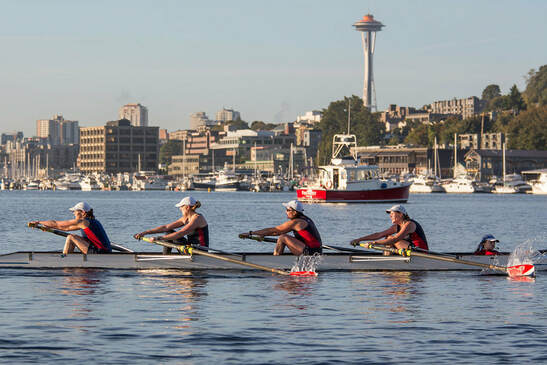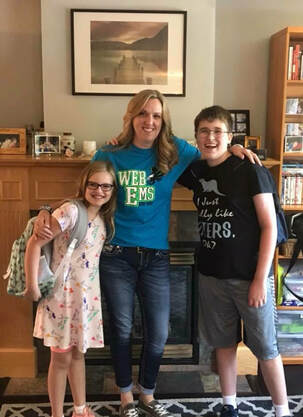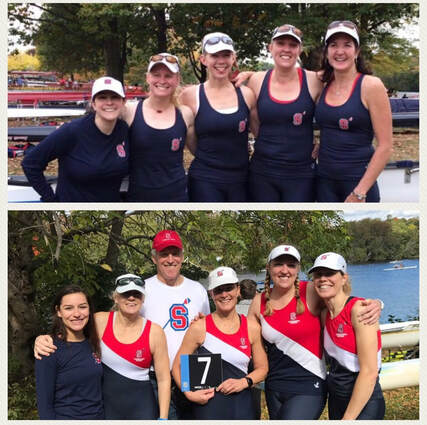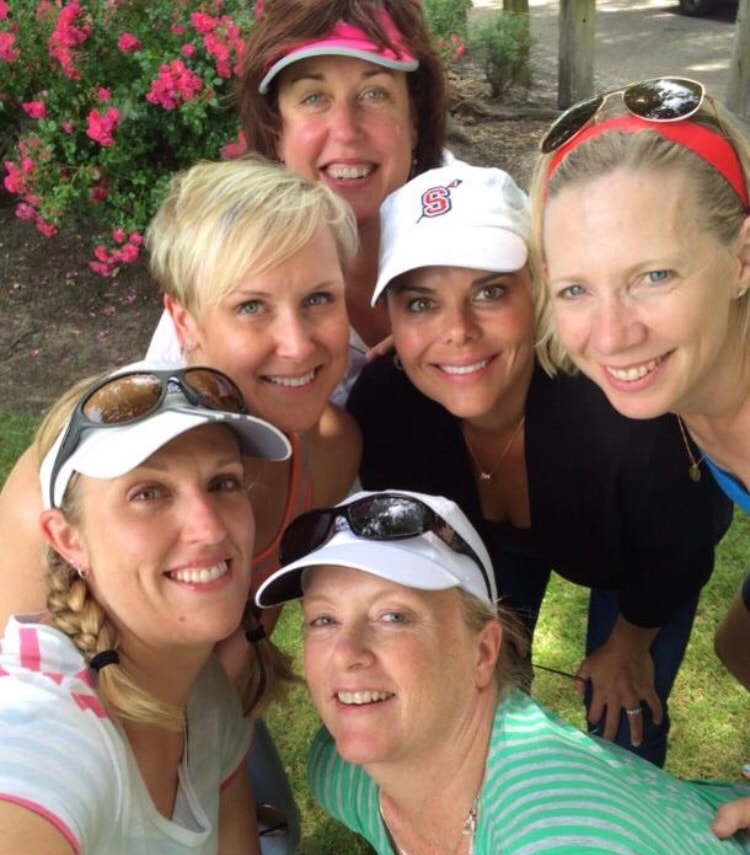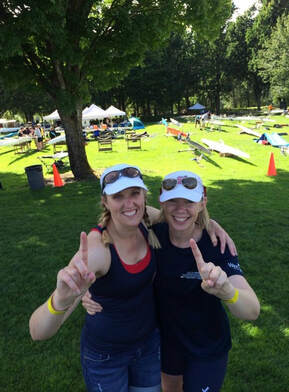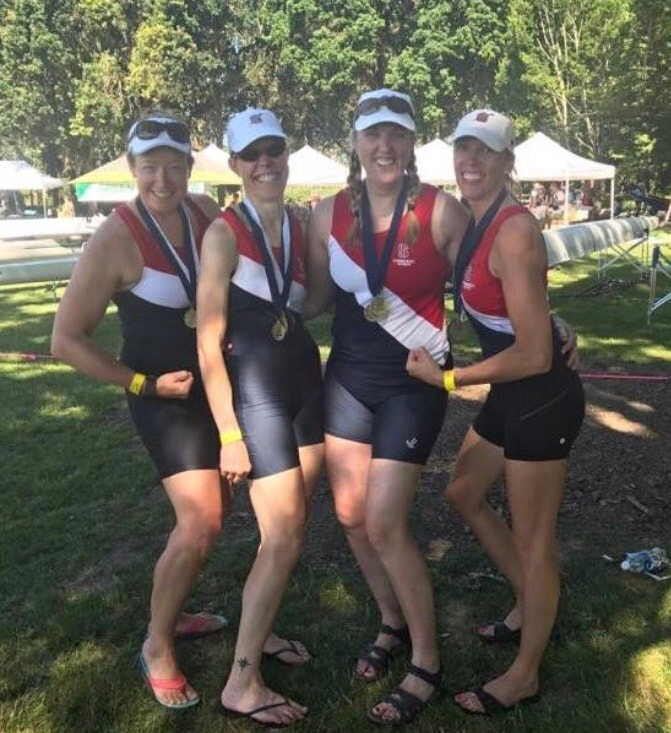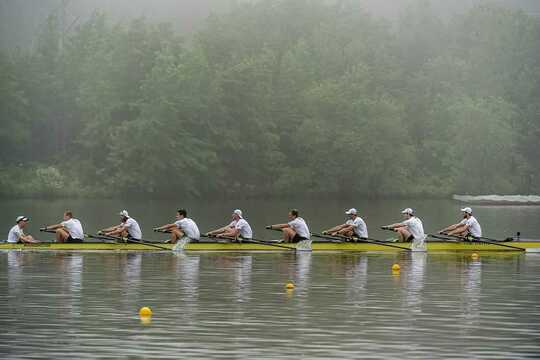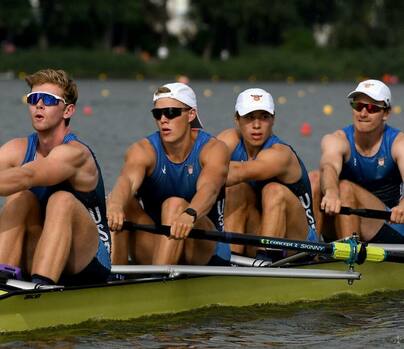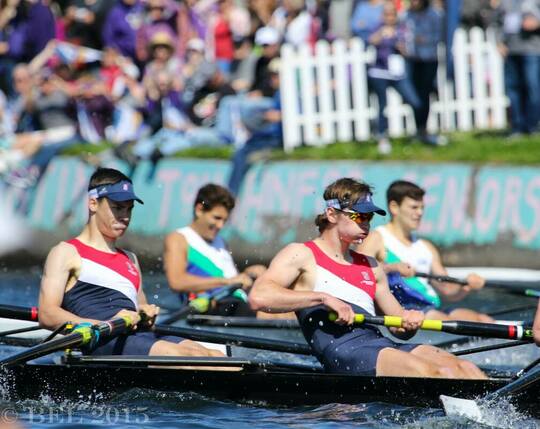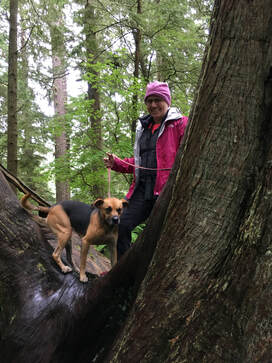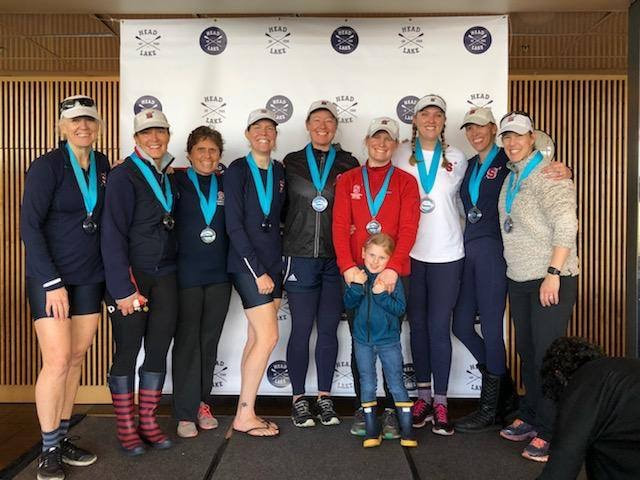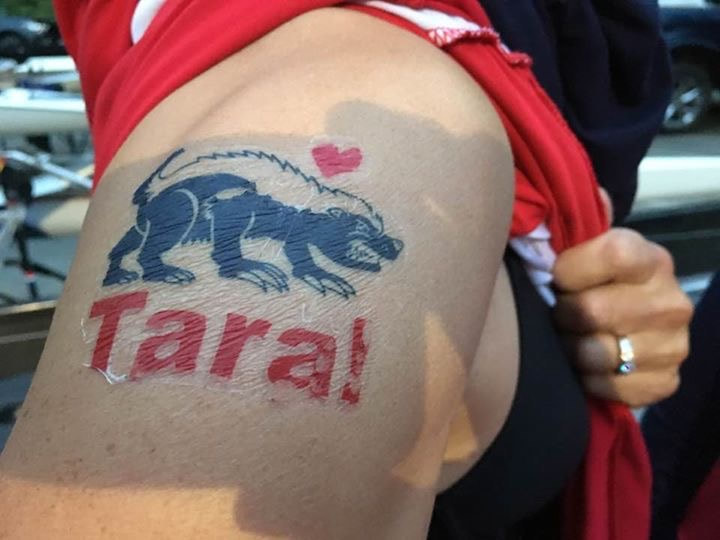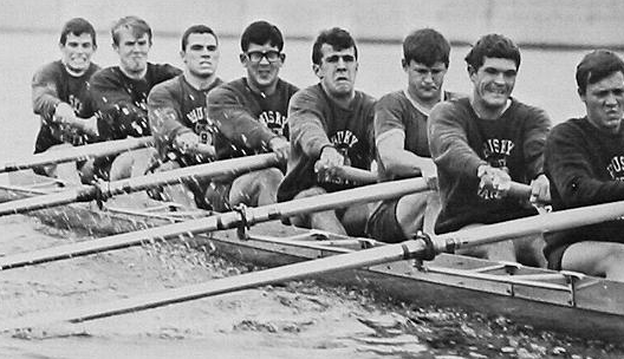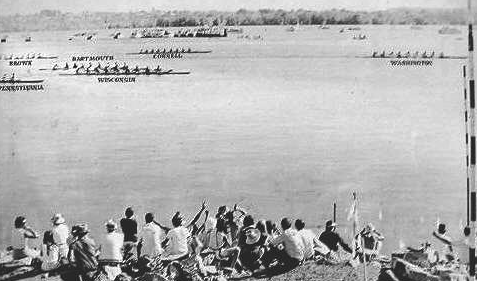|
Novice year is a rite of passage at Sammamish Rowing Association (SRA). Every rower goes through it, but everyone has a different experience. Trish Miller describes her novice year as one that changed her life. Miller currently serves as Activities Coordinator and teaches Leadership classes at Evergreen Middle School, where she previously taught Science and Fitness. In 2000, a fellow Fitness teacher and previous SRA rower asked Trish if she had ever tried rowing. It took Miller some time to work up the courage to try it, but after years of her colleague’s pestering, in July of 2008, Miller decided to give rowing a shot. Miller was hesitant to join because she knew nothing about rowing and had never been good at sports. She remembered, “I tried every sport known to man growing up and I was terrible at all of them,” but she knew she needed something. “At that point I just needed something for myself. I had a two-year old son, and I needed something for fun and fitness—something on my own where I wasn’t anyone’s mom, wife, or teacher. I needed something for me. That’s initially why I started.” Trish completed Learn to Row (LTR) I and LTR II before she found out she was pregnant and had to stop rowing. After her daughter was born, it took her two years to come back to rowing, but she just couldn’t get it out of her head.
In the spring, Tom Woodman asked Trish to seat race for Opening Day. At that point she had not even been rowing for a full year. “We had one mixed eight going. When he asked me to seat race, I didn’t realize I was actually competing to go. I thought I was just helping the experienced team seat race.” She laughs, thinking about it. “I really knew nothing about this sport. I had never seat raced before. But somehow, I won my seat race and that May I was able to race Opening Day. It was incredible to be given the chance to experience that level of competition so early on.” One of her favorite rowing memories happened later that year at another prestigious race: The Head of the Charles Regatta. Miller opened up about everything that went wrong that day in October 2012. “There were major equipment issues. We rented a boat from CRI. Their boathouse was beyond the finish line, so had we to row about 6,000 meters through boat traffic to get to the start line. We were not even passing the finish line area when we realized we had lost our skeg.” She talked about how she wondered if they would even make it to the starting line. They saw another CRI crew who had finished rowing and asked to borrow their boat thinking what could be the harm in asking? The CRI crew agreed, and both crews swapped places on the water!
Miller admitted she lacked confidence and was afraid to try new things before rowing. She said she did not put faith in herself to rise to a challenge. “Now I welcome the challenge. In the last two years especially, I’ve been better about trying new things, testing my limits, and seeing what I am capable of. It all started here (SRA),” Miller said.
Miller, like many other rowers in our SRA stories, had some advice to give. She encourages new or inexperienced rowers to trust others. To her, trusting teammates is more important than technique. “Trust in a boat is the one factor that will make or break a race and will make or break a team. Always assume the best intent of your teammates. If you look at our 5AM women at a start line, we are not the biggest women or strongest women, but we absolutely trust and support one another, and I think that’s the magic. That is what makes us a winning team—that we will support each other to the end.” Miller went on to say, “I was extremely lucky to have such an incredible novice experience, but even without all the excitement, I would’ve kept coming back. I was hooked from that first month. This is a lifetime sport for me. I think it’s because the sport itself, and the people who do it, won’t ever allow me to get complacent. You can never be perfect at it. The sport is always changing, depending on the race, the crew, the conditions. The challenges are endless. You have to keep pushing and learning, stretching yourself and growing. My closest friends are rowers, people I met at SRA. And I love them for the same reasons that I love the sport. They push me to continually strive for more than I ever imagined I was capable of. I’m not afraid to try new things anymore. I have SRA and my teammates to thank for that. Any boat, any seat, anytime, anywhere. I’m in. Bring it on.”
That year he joined Sammamish Rowing Association (SRA) and instantly understood why his friends had kept pestering him about the sport. “My experience at SRA was awesome. From the very beginning I fell in love with the sport and started making new friends, many of them I still keep in touch with,” Maesner added. Rowing is uniquely both individual and team oriented. Sitting in your seat in the boat you are in your own bubble, but you work together with your team for a common purpose. That teamwork led to one of Eli’s most memorable moments rowing for SRA. During his senior year in high school, Eli’s boat won at Brentwood Regatta followed by a win at Regionals a few weeks later. “It was super awesome because we had only one or two practices in that lineup before we raced at Brentwood and we still ended up pulling out the win. Then a few weeks later going and winning regionals for the second time ever was incredible.” The thrill of a first place finish is addicting, and the satisfaction from executing a solid race with some of your best friends and teammates is an incredible experience. Eli’s rowing career would not end his senior year of high school. Through his hard work and dedication to the sport he loved, he was recruited to the University of Washington’s Rowing Program coached by Michael Callahan.
Rowing is a huge part of Maenser’s life, but he has made sure to find balance outside of the boathouse. As an Environmental Studies Major, Maesner is currently doing an internship with UW Athletics focusing on sustainability in college athletics. It is also part of his senior capstone research project required by his major. Rowing, Maesner said, has helped him balance other areas of his life. He commented, “Rowing has taught me how to prioritize and move on once something is done. This has been very beneficial in that while at practice- that’s your only focus and priority, but then once you leave you should completely forget about the practice or the erg piece and go and do something else. Whether it’s school work, hanging out with friends, video games, or just watching TV all of these help me move on from practice whether it was good or bad.” Even though rowing can be incredibly demanding, many athletes, like Maesner, find that the discipline and rigor of crew make them better time managers. It also makes athletes strong goal setters. Maesner’s next goal? “Winning the varsity eight event at the IRA national championships,” he said.
Neider has stuck with rowing for several reasons, but one was particularly important. She said, “ I am a female engineer and until I started rowing again in 2001 I didn't have many female friends. I mostly work with men. I found that rowers are driven individuals that give their best no matter what they do. I feel a very strong bond with other rowers and have found lifelong friends. When I joined the 5am program at SRA, the other women really made me feel at home. They erged with me, invited me to coffee (I row for coffee), and let me know what they were doing on their off days. I come back for the friendship and camaraderie.” Not only did her rowing friends support her, but she found support through her family as well. When thinking back to one of her favorite rowing memories she thought of one that involved her kids, Mark and Kate. “The first year I joined the Annapolis Rowing Club, four of us formed a 4+ over the winter. My friend Lisa told me that we had to form our own boat to be successful. Our first race was the Stonewall Regatta in Washington DC. My husband and my two children came to watch and we blew the other boats away. Afterwards my son said to me ‘I knew you rowed but I had no idea you were any good!’. It made me happy to be respected by my kids.” However, just a year after she joined SRA, Neider received some terrible news about her health. She was diagnosed with cancer and underwent surgery, radiation treatments, chemotherapy treatments, and now is on an Estrogen blocker. She was diagnosed in the early stages of her cancer, and she looked for several opinions on treatment plans- including asking fellow rower Tanya Wahl who is an Oncologist.
Neider didn’t want cancer to impact her rowing, but inevitably it often did. She explained, “During chemotherapy I found out that there was a very clear cycle to my well being. I felt good the day of treatment and the day after, then got worse over the rest of the week and then felt a bit better for the next two weeks until the cycle started again. So I took off on the really bad days, coxed on the not so great days and rowed on the better days. I really think that continuing practice helped me get through the treatments and also made it a lot easier to get back into shape.” Rowing was a form of recovery for Neider, who found more than physical health benefits from it. She talked positively about the support she received from the team. “I got to row at the Row for the Cure Regatta before I started my treatments. The whole morning team had tattoos with my name and a badger (my spirit animal) on them. I really knew I was not in this alone. It was so wonderful. The team was really amazing, and I feel a little guilty because they helped so much.” Before going through her cancer diagnosis, Neider believed rowing to be a powerful tool. It taught her positivity, teamwork, determination, hard work, and the ability to push yourself through any situation. Now continuing the sport through her cancer- she feels those lessons have been amplified. Neider has advice for those struggling with their health and says, “Stay positive and don't feel sorry for yourself. Everyone has challenges. It is how you deal with them that makes you different. Plus exercise everyday if you can- maybe not what you could do before but something every day.”
The SRA community is grateful for rowers like Tara Neider. We are a community of strong, supportive people who put people first. Our strength is not only demonstrated in our erg scores or pieces on the water, but also in the kindness and acceptance in our hearts. As we often say in rowing, “Eight hearts must beat as one or you don't have a crew. There are no fast boats, only fast crews."
Dee Walker is retired now. Before retirement, he worked mainly in manufacturing for 50 years including time at Olympic Stain and Kenworth Trucks . He is also approaching the 50 year mark in his marriage with his wife Sally- a marriage which has given him a wonderful family of 2 children and 2 grandchildren. One of his grandsons attends Montana State while the other is a junior in high school looking to play collegiate baseball. Even though the parents of his Montana State grandson also went to college there- Walker was born and raised in Seattle. His grandfather was also born in Seattle (in 1890) so Dee’s Seattle roots go far back. Growing up in Seattle, Walker was first introduced to rowing when he joined Green Lake Crew in high school in 1965. He rowed two years in high school and eventually went down the road to the University of Washington to join their rowing program for four years. His coach at Washington was the legendary Dick Erickson. Erickson coached from 1968 to 1987 and added achievements such as a national collegiate championship and a Henley Royal Regatta victory to his coaching resume. When asked about his favorite rowing memories, Walker had many, but reflected on two during his time as a Husky Oarsman. In 1970 the first Opening Day Regatta (now known as Windermere Cup) was held on the Montlake Cut course. “UCLA at the time had a really good men’s program, and UCLA came up for a dual with Washington. The Junior Varsity race was first. I rowed bow in the boat and we won. So I was the first person to cross the finish line in the first Opening Day Regatta!” Walker said with a grin, reflecting on how cool the experience was.
It turns out Walker wasn’t the only one in his family to have rowed for the Huskies. In 1918 and 1919 his grandmother rowed on the women’s team at Washington. Women were judged on style and form rather than race results. Eventually the women’s team at the time fizzled out and the modern team we know today started up in 1969. Dee’s younger brother also rowed for the Huskies, graduating in 1979.
After his collegiate rowing days were over, Walker took a bit of a break from the sport. Make that a 45 year break. Walker recalled that there was a point once he retired that his wife said, “I’m tired of the same old stories. I want some new rowing stories. Find some new friends and start rowing again.” With that encouragement, as well as the growing reputation of SRA, Walker decided to row again. So in 2015 Dee joined the 5am team at Sammamish Rowing Association. During his 45 years away from rowing, Dee remained active in water sports including canoeing expeditions in Canada, Montana, and on the Columbia River. In addition he raced marathon canoes (2 to 3 hour races at 60 strokes per minute) for over 30 years. This included a 3rd place finish in the 1998 World Masters Games. Walker talked about another favorite memory that began shortly after joining SRA. “Dave Worthington, Scott Merritt, Steve Waltar, and I were talking and we were like, ‘you know- we ought to talk with Tom and see if we can get him to enter a 60 year old 4+ at the Head of the Charles.’ Tom didn’t want to do it, but we finally convinced him to. We got into the race and finished 3rd which earned us a place the next year. We were 3rd again the following year. In 2017 I wasn’t in the boat, but they won and set a course record. It was the first SRA boat to ever win a Head of the Charles event.” Walker is still ecstatic for his teammates’ win just like he was for his 1970 Husky Crew when they won the IRA National Championship. He is proud of SRA and his teammates and it was a moment he will never forget. Dee is also proud of the SRA team accomplishments at the 2018 Masters Nationals. We combined teammates from across SRA plus junior coxswains. “We practiced together, we raced together, and we won together. Over 40 SRA athletes and coaches participated in Oakland. We won the team points championship.” Dee is a “visual” person and the best indicator of the team’s success was seeing the entire back of the team truck filled with “hardware”. Walker has had so many valuable and fun experiences in his life and as a rower. He credits the sport with teaching him the importance of teamwork. “My best friends to this day are the people I rowed with in college and now my SRA teammates. Because I know other people are counting on me and I am counting on them - it’s one of the most important life lessons- knowing with certainty you can count on your teammates,” he added. Dee knows rowing is a wonderful sport and is thrilled so many people love the sport as much as he does. He believes it keeps a person young. It is fun for him to know that his grandsons are older than most of the junior rowers yet Dee still has the opportunity to row and race with his teammates. His advice? “If you’re a student- stick to your studies.” For less experienced rowers, he encourages them to appreciate older, more experienced rowers for their accomplishments and to ask about their stories. Walker regrets not talking to experienced rowers he had multiple opportunities to talk to. Some of those rowers ended up becoming renowned in the book The Boys in the Boat. His last bit of advice is to be passionate about rowing, have enthusiasm in your life, and take advantage of opportunities you have. “If you can’t be passionate about something or enthusiastic about something- find something that you can be. Enthusiasm is the foundation of everything. Ralph Waldo Emerson said ‘nothing great is ever accomplished without enthusiasm’, and that’s kind of my motto,” Walker ended with. Dee now serves as the president of SRA's Board of Directors. |
Archives
April 2023
Categories
|
|
Sammamish Rowing Association
5022 W. Lake Sammamish Pkwy NE Redmond, WA 98052 [email protected] 425-653-2583 |
Mailing Address:
Sammamish Rowing Association P.O. Box 3309 Redmond, WA 98073 |
|

